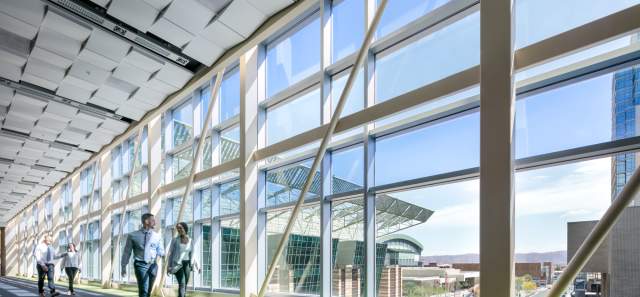Without a doubt, Phoenix is known as a hiking destination, and for good reason. The magic of the Sonoran Desert can be seen, and reached, from the area’s luxury resorts as well as the city’s downtown core, and just about everywhere in between.
What might surprise some, is that there are countless barrier-free trails and paths that invite all to immerse themselves in this city's natural surroundings.
Here’s a list of our top hiking spots — where you can take in the sunsets, desert vistas, flora, fauna and all the other natural wonders that make Phoenix so unique. Barrier free.
Urban Paths
Back to Top of ListUrban Paths
Desert Botanical Garden
The Desert Botanical Garden is a 140-acre venue that showcases a variety of arid plants, from towering saguaros to delicate blooms. For an up-close and personal introduction to the Sonoran Desert, explore more than 50,000 plant displays — via five thematic trails (paved and hard-packed) — that illustrate such topics as conservation, desert living, plants and people of the region and desert wildflowers. This space also plays host to rotating art installations, cultural festivities and seasonal events.
1201 N. Galvin Parkway, Phoenix
Papago Park and Papago West Park
Several trails cut through Papago Park, which is also home to the Desert Botanical Garden and the Phoenix Zoo. Here you'll find trails with varying surfaces and degrees of incline circumnavigating the unmistakable sandstone buttes. The Elliot Ramada Loop Trail, located across the street from Papago Park in Papago West Park, is a paved and dirt trail that loops 2.7 miles. Use the West Buttes parking lot for easiest trail access.
625 N. Galvin Parkway, Phoenix
Japanese Friendship Garden
The Japanese Friendship Garden is an authentic 3.5 acre Japanese Stroll Garden that is a sister city project between the City of Phoenix and Himeji, Japan. Named Ro Ho En — Ro is Japanese for heron, Ho means Phoenix bird and En is garden — this tranquil and beautiful setting features more than 1,500 tons of hand-picked rock, stone footbridges, lanterns and more than 50 varieties of plants, all right in the heart of downtown.
The paved paths here wander past flowing streams, a 12-foot waterfall, koi pond with over 300 colorful koi fish, tea garden and tea house. Additionally, the garden's parking, restrooms, and facilities are wheelchair and motorized scooter accessible. A wheelchair is available on a first come, first served basis. If needed, please call 602-290-6609 to check on availability before your visit.
Tempe Town Lake/Tempe Beach Park
Nearly 7.5 paved miles circle this urban lake near downtown Tempe's Mill Avenue and Arizona State University. Along the way, take a break at grassy parks, keep an eye out for public art installations or go fishing (with a proper permit, of course). The 25-acre park has been the historical center piece for Tempe since the 1920s, and features a splash playground, volleyball courts, and picnic areas. From the Mill Avenue Valley Metro Rail station, the park entrance is about 0.2 miles away.
80 W. Rio Salado Parkway, Tempe
Canal Trails
With 180 miles of paved and hard-packed paths, Greater Phoenix's canal system offers some of city's best barrier-free urban exploring. And, by the way, that's more miles of canals than Venice and Amsterdam combined.
The Arizona Canal stretches through the Arcadia neighborhood and in and around areas such as the Biltmore Fashion Park and Camelback Corridor. One of the most surprising installations along the canal system is Phoenix Art Commission’s "WaterWorks at Arizona Falls," designed by renowned Boston artists Lajos Heder and Mags Harries. Formed by a natural 20-foot drop along the Arizona Canal between 56th and 58th streets, Arizona Falls reopened in June 2003 as a restored hydroelectric plant and neighborhood gathering place where visitors can learn, interact and reflect.
The Grand Canal runs approximately from the Pueblo Grande Museum to just beyond the Melrose District. As part of the 2021 PHX Mural Project Fest, the Grand Canalscape received a makeover in the form of dozens of sustainability-focused murals by some of the city's best-known artists (from 15th Avenue to 7th Street). Be advised that some areas of the canal paths do cross intersections and, in some cases, one side of the canal will be paved while the other is hard-packed.
Steele Indian School Park
Conveniently located next to a Valley Metro Rail station, Steele Indian School Park is an oasis for downtown dwellers as well as attendees of the wide variety of annual festivals it plays host to. This 72-acre park features a paved path that hugs its perimeter, as well as a playground, basketball and volleyball courts, shaded ramadas, dog parks, a fishing pond and more.
300 E. Indian School Road, Phoenix
Nature Walks
Back to Top of ListNature Walks
Rio Salado Habitat Restoration Area
Less than two miles south of downtown Phoenix, this 600-acre restoration area stretches along 5 miles of the Salt River and is home to the Nina Mason Pulliam Rio Salado Audubon Center as well as more than 250 birds. Stroll or roll on paved or hard-packed trails along the dry riverbed running through the heart of Phoenix. With lush vegetation, birds flock to these wetland ponds and arching cottonwoods in great numbers, making is a birders paradise. Grades hit 5% when the paved trail ducks under street bridges. Trailheads are located along the riverbed at Seventh Avenue, Central Avenue, Seventh Street and 16th Street.
2439 S. Central Ave., Phoenix | 641 W. Lower Buckeye Road, Phoenix
Riparian Preserve at Water Ranch
Also known as Gilbert Water Ranch, this 110-acre preserve offers a mix of flat, dirt trails to choose from. Start on the concrete trail around Water Ranch Lake, then branch off to the dirt trails that circle the preserve's seven ponds. Look for posted signs and placards for information on the area's plants and animals, which include more than 200 species of birds (this is also why it's among the state's best parks for urban birding). Additional amenities include benches, ramadas and an observatory.
2757 E. Guadalupe Road, Gilbert
Barrier-Free Nature Trail, Reach 11 Recreation Area
Reach 11 Recreation Area is a 1,500-acre district park that offers 18 miles of multiuse trails. However, the Barrier-Free Nature Trail is a partially paved .75-mile (one way) interpretive trail with signs and placards that highlight facts about the local flora and fauna. And, depending on the time of year, visitors may see quail, jackrabbits or a coyote or two taking advantage of the food and water supply. The trailhead and parking lot are on the east side of Tatum Boulevard, just north of Union Hills Drive. Portions of the trail do exceed a 5% grade.
Boyce Thompson Arboretum
The oldest botanical garden in the state features a mix of paved and hard-packed trails, including 1.5-miles of new walking paths, and loops through the recently-opened Wallace Desert Garden. Enjoy a well-laid cactus garden, in addition to a riparian area, an Australian forest, and herb and rose gardens. Guided trail tours are available for a nominal fee with advance registration. Located in the town of Superior, roughly 64 miles or an hour east of Phoenix.
Mountain Trails
Back to Top of ListMountain Trails
Judith Tunell Accessible Trail, South Mountain Park and Preserve
At over 16,000 acres, South Mountain Park and Preserve is one of the largest municipal parks in the country. While it offers 58 miles of trails, the Judith Tunell Accessible Trail is the barrier-free standout. Named after Judith Tunell, a local accessibility advocate, this trail includes two 0.5-mile, hard-surface loops: the Interpretive Loop (maximum grade of 7.5%), which features signage, including Braille, highlighting native plants and animals, and the Challenge Loop (maximum grade of 8.5%). Both loops feature drinking fountains, benches and covered ramadas for periodic rest stops.
10919 S. Central Ave., Phoenix
Skip Rimsza Paseo (East and West), Phoenix Sonoran Preserve
Located in north Phoenix, and accessible via the Apache Wash Trailhead, both the East and West Skip Rimsza Paseo options offer a paved, concrete surface with very gradual incline and little gain in elevation. The West trail is 1.9 miles in length, while the East Trail is 3.1 miles.
1600 E. Sonoran Desert Drive, Phoenix
Penny Howe Barrier Free Trail, North Mountain Park
Explore the foothills of this park via its 0.3-mile paved trail, which includes two small loops. Interpretive signs are posted along way and the grade of the trail does exceed 5%. Additionally, the parking area is large and paved, with multiple designated accessible parking spaces and at least four striped access aisles.
Merkle Barrier-Free Trail, Usery Mountain Regional Park
Usery Mountain Regional Park offers over 29 miles of trails for hiking, mountain biking and horseback riding. Park trails range in length from 0.2 miles to over 7 miles, and from easy to difficult. Merkle Barrier-Free Trail, however, is a wide, 1-mile path that winds through the park. Expect to find hard-packed gravel and grades ranging from 3 to 5%, as well as a cactus-dotted landscape and views of the Superstition Mountains.
Jane Rau Interpretive Trail at Brown's Ranch
Named after a local conservationist, the barrier-free Jane Rau Trail at Brown's Ranch winds nearly 0.5 miles through Scottsdale's McDowell Sonoran Preserve. The packed-dirt trail follows a wash and is adorned with shaded benches. Worth noting, however, the trail has sections of grading higher than what is standard for accessible trails currently, as it was built to 2013 U.S. Forest Service trail accessibility standards.
30301 N. Alma School Road, Scottsdale
Native Plant Trail, Lost Dutchman State Park
In the shadow of the mighty Superstition Mountains, there’s a paved 0.25-mile trail that kicks off next to the visitor center. The loop showcases such native plants as cholla, prickly pear, ocotillo and more — with names and pronunciations labeled — along an accessible, paved trail. This trail is located near the ranger station, just follow the path just beyond the accessible parking sign.
6109 N. Apache Trail, Apache Junction
Editor's Picks
Accessible Phoenix
Transportation information, trip ideas and other accessibility related resources for your next visit…
Order Visit Phoenix Travel Guides
Request bulk orders of our Official Travel Guide and Meeting and Travel Planner Guide for your…
Top Phoenix Attractions
Serene desert gardens, one-of-a-kind museums, award-winning dining and more: Make sure these…







